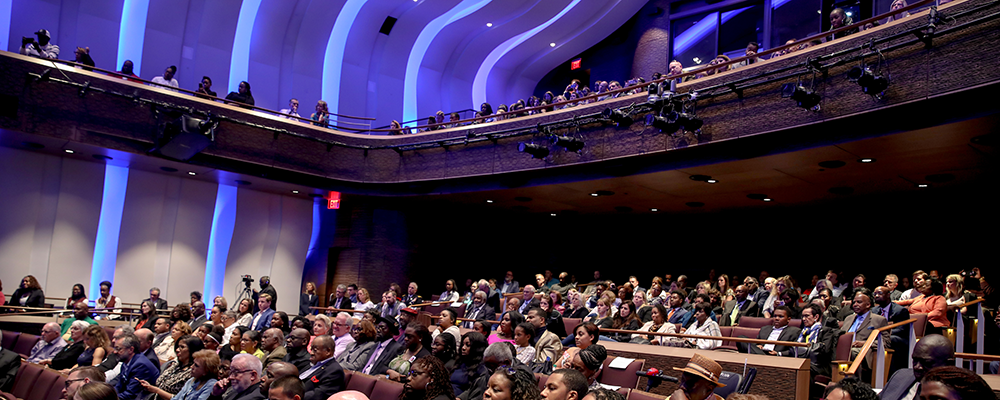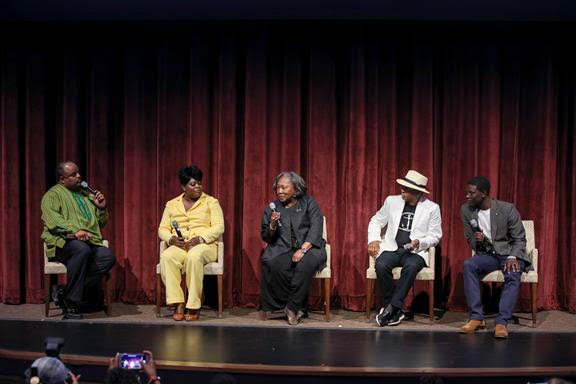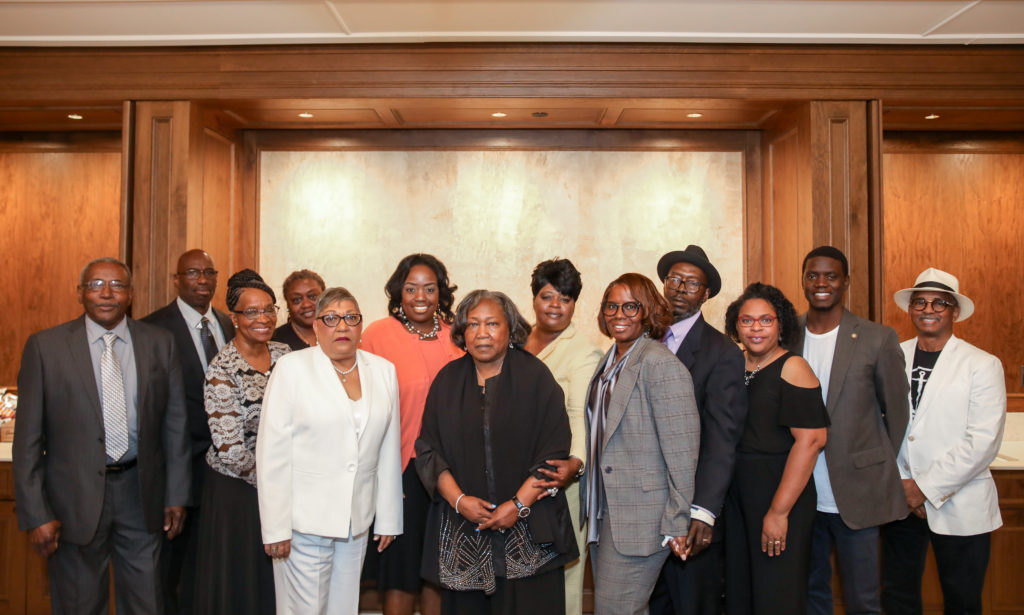
Movie Review: EMANUEL
RELATED: Urban Faith Q&A with EMANUEL Director Brian Ivie
Forgiving the gunman who shot nine worshipers four years ago during Bible Study at Emanuel A.M.E. Church wasn’t an option for some family members.
“Let me tell you something. I was really mad. Really angry,” said Nadine Collier, whose mother Ethel Washington Lance was among those killed when seventy-seven bullets were fired as they bowed their heads to pray on the evening of June 17, 2015. “But when you look at him, you can’t give this person the power over you. You just can’t.”
Collier made these remarks at the Washington, D.C. premiere of EMANUEL, a documentary film on the shooting set to screen June 17 and 19 in theaters across the country, marking the somber fourth anniversary of the tragedy. Through interviews, family members tell the stories of their loss as scholars help viewers understand this mass shooting through the lens of South Carolina’s past.
The film’s two-night run also highlights the extraordinary remarks family members made to the shooter just forty-eight hours after the killings of their pastor, their grandfather, their mothers, their aunts, their sisters, and their children.
“I just want everybody to know that I forgive you,” Collier said to then 21-year-old Dylann Roof, a self-proclaimed White supremacist, as he appeared before the court and the family members via video conferencing for his bond hearing. “You took something very precious from me. I will never talk to her ever again. I will never be able to hold her again, but I forgive you and have mercy on your soul. You hurt me. You hurt a lot of people, but God forgive you and I forgive you.”
Reverend Anthony Batiste Thompson lost his wife Myra, who that night was leading the Bible study for the first time. But he continued those sentiments. “I forgive you and my family forgive you…We would like you to take this opportunity to repent. Repent, confess, give your life to the one who matters the most—Christ, so he can change you.”

Roland Martin leads a panel discussion with Nadine Collier, Polly Sheppard, Rev. Anthony Batiste Thompson, and Chris Singleton after the screening of the film ‘Emanuel’ at the Museum of the Bible on May 14, 2019, in Washington, DC.
In the film, Felicia Sanders recounted feeling the warmth of her son’s blood after Roof walked up to him and fired several bullets into his body while she and her eleven-year-old granddaughter quietly lay nearby under a table. But she too forgave.
“You have killed some of the most beautifulest people that I know,” Sanders said. “Every fiber in my body hurts and I’ll never be the same. Tywanza Sanders was my hero, but as we said in the Bible study, “We enjoyed you, but may God have mercy on you.” Roof also shot and killed Susie Jackson, Sanders’ aunt.
Given the lingering effects of South Carolina’s legacy as the first state to secede from the union during the lead up to the Civil War, along with the historical burnings of Black churches, some onlookers found these expressions of forgiveness remarkable.
As the filmmakers analyze the events of the shooting four years later, during a time in America when the ideology driving violent acts of White supremacy persists, they hope audiences develop a greater understanding of this reaction and a deeper insight into the capacity for forgiveness among these family members. All have deep connections to their faith and to Emanuel A.M.E., one of the oldest Black churches in the South. Even as they sought justice, they chose to forgive the person who took away their loved ones, forever changed the course of their lives and tested their faith.
“It’s a miracle that people here can forgive…and that’s not just because they were conditioned by their environment. Those that forgave—it wasn’t an act of weakness by any way,” said Dimas Salaberrios, one of the film’s co-producers. “God showed up and did something that we can’t explain, but it’s very real and it’s very powerful. I hope that African Americans around this nation will really tune in and see what God has done and the hearts that he’s given us to be able to forgive.”

WASHINGTON, DC – MAY 14: Friends and family of “The EMANUEL 9” before a screening of the film ‘EMANUEL’ at the Museum of the Bible on May 14, 2019 in Washington, DC. (Photo by Tasos Katopodis/Getty Images for EMANUEL Film)
Not all family members immediately forgave the shooter and that, too, is an important part of this story, Salaberrios says. “What I’ve learned from examining the lives of these families is that different people are in different places.”
Bethane Middleton Brown lost her sister Reverend DePayne Middleton-Doctor in the shooting. “I agreed that we needed to [forgive], but I wasn’t there yet,” Brown said. “Mine came because I noticed that my anger was getting worse. I didn’t understand what I was feeling. Finally, I was able to put a face on my emotions and realize that I had forgiven. I never have any anger that links [Roof] in my thoughts. My anger is just simply, I want my sister here. So I have forgiven. I still would like to make sure justice stays, but I have forgiven.”
The loss of these nine lives led to the immediate removal of the Confederate flag, which flew on the grounds of the state capitol building for decades and was featured in many of the images Roof posted on the pages of his social media accounts.
Even so, four years later Tyrone Sanders, husband of Felicia and father of Tywanza, who at 26 was the youngest victim, still is struggling with forgiveness.
“I don’t think I can ever get there. I guess the historic truth about America, you know like slavery, the Indian Removal Act, and Trump’s talking about building a wall,” Sanders explained. “I was born and raised in the church. Christened, baptized, sang in the choir. My grandfather was a preacher. My great grandfather was a preacher. My mother sang in the church and all of her sisters. I grew up in the church,” he said.
But that still isn’t enough to comfort the loss of his son during that midweek Bible study at Emanuel A.M.E. that evening. “If I’ve got to forgive, that’s where it will be. Up there. It won’t be on this side. I’ll take that to my grave.”
With EMANUEL as his second major documentary film project, these are the stories that director Brian Ivie feels called to capture.
“What I am trying to do within the context of faith-based films is try to make films that speak to the reality of God to an audience that may or may not believe and that is disinterested and disillusioned,” Ivie said.
Among the films producers include actresses Viola Davis and Marisky Hargitay and NBA MVP Stephen Curry who will donate their share of the profits to the survivors of the shooting and the families of the victims. Visit www.emanuelmovie.com for more information about the time and location of a screening near you.
